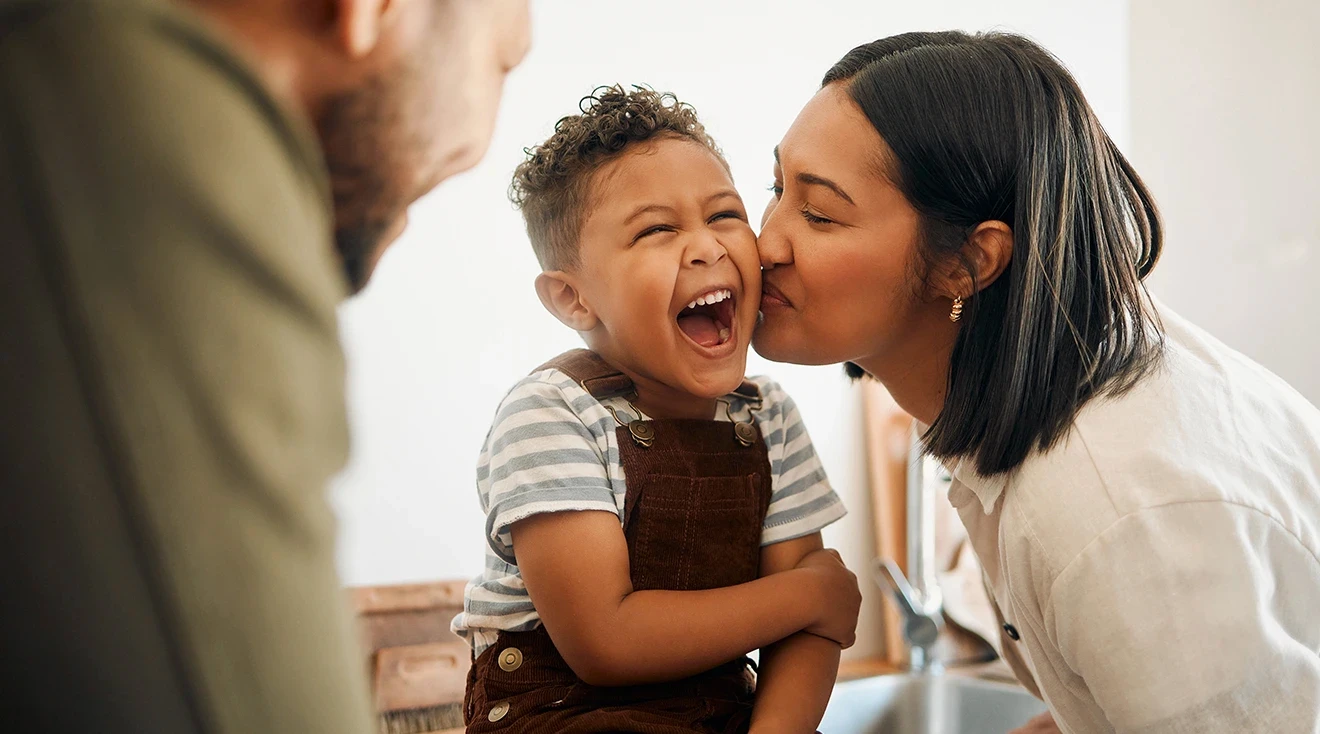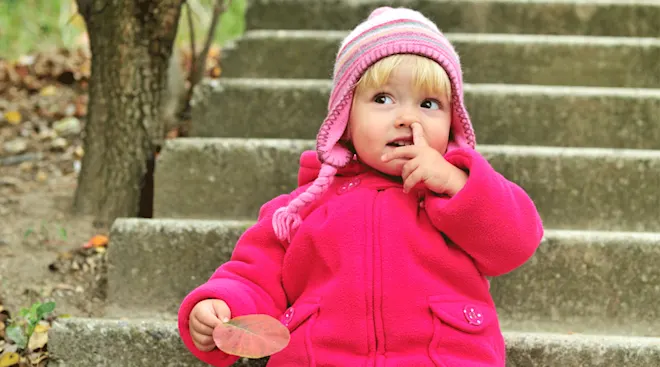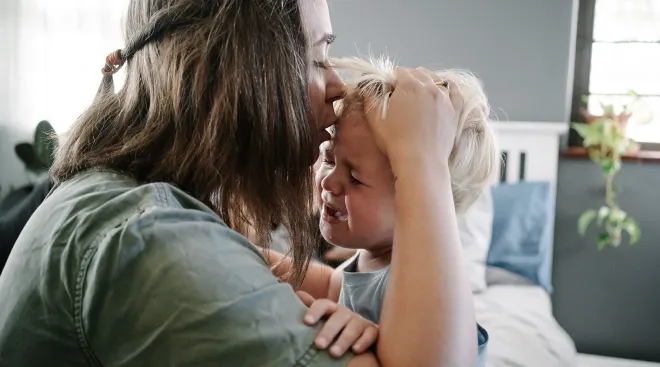What Are the 4 Main Parenting Styles?
Parenting has got to be one of the toughest jobs out there. So many decisions to make, so many opinions to contend with, so many options for how to handle things—how are we supposed to know what’s “right”? And then there’s dealing with the consequences our parenting choices can have on our kids—talk about pressure. For years, researchers have been tangling with this critical (and, let’s be honest, often confusing) topic. While there are definitely nuances to every approach, experts generally recognize four parenting styles that influence how you raise your child, based on the research of psychologist Diana Baumrind. Read about the Baumrind parenting styles—and how to choose the right one for you—below.
Diana Baumrind, a developmental psychologist, first laid out these types of parenting styles in the 1960s through her research at the University of California, Berkeley. She conducted a series of studies that looked at people’s approach to parenting based on the demands they placed on their children and their responsiveness to their kids’ needs, and identified three primary parenting styles. A fourth parenting style was added later by two other researchers.
1. Authoritarian parenting style
Authoritarian parenting is a strict style in which parents set rigid rules and high expectations for their children but don’t allow them to make decisions for themselves. When rules are broken, punishments are swift and severe.
2. Authoritative parenting style
Authoritative parents provide their children with boundaries and guidance, but give their children more freedom to make decisions and learn from their mistakes.
3. Permissive parenting style
Permissive parents give their kids very few limits and have more of a peer relationship than a traditional parent-child dynamic. They’re usually hyper-responsive to their kids’ needs (think helicopter parent) and give in to their children’s wants.
4. Neglectful parenting style
A style added later by researchers Eleanor Maccoby and John Martin, neglectful parents don’t interact much with their kids, placing no limits on their behavior but also failing to meet their children’s needs.
These four parenting styles—which still form the foundation for much of today’s research into childhood development—make up a broad spectrum of behavior that explains how most parents care for their kids. Of course, every parent-child relationship is unique and every day is different, but chances are, your natural mode of parenting falls somewhere among Baumrind’s parenting styles.
Not sure which of the Baumrind parenting styles represents your own? Find out more about the parenting styles below to see which one fits you.
“In authoritarian parenting, you’re saying, ‘I don’t trust you to manage things, but rather than doing things for you, I’m going to force you to do what’s right,’” says Alyson Schafer, a Toronto-based therapist and author of Ain’t Misbehavin’. Parents are the rulers of the roost—and it’s their way or the highway. This is an old-school type of parenting, where rules are strict and don’t leave much room for interpretation, punishments are swiftly meted out and kids rarely have a say in making decisions or choosing things for themselves.
What does authoritarian parenting look like?
If you regularly find yourself saying, “Because I said so,” you might have an authoritarian bent to your approach to raising kids. Authoritarian parents have strict rules that should be followed no matter what, decide things for the child without their input, resort to punishment to ensure obedience and may be less affectionate or “warm and fuzzy” than parents who subscribe to other parenting styles.
Effects of authoritarian parenting
“Kids [in authoritarian households] will behave as long as the autocratic leader is in the room,” Schafer says. “But the minute you leave—especially when they’re a little older and finally get a taste of freedom—they’ll either rebel or look for someone else to show them what to do.”
Schafer says kids with authoritarian parents tend to:
- Develop a “follower” mentality and readily conform without thinking for themselves
- Have a hard time discerning right from wrong on their own
- Struggle with self-esteem issues, relying on other authority figures to confirm they have worth
Of the Baumrind parenting styles, authoritative parenting is often considered the gold standard—the happy medium between the strict authoritarian parenting style and the permissive approach. Authoritative parents do set limits for their children, but are also responsive to their needs. Consider it a firm, but nurturing style. “Parents operate like CEOs, but in a friendly way that is respectful and allows the child to learn from consequences,” Schafer says.
What does authoritative parenting look like?
Authoritative parents give their children room to make decisions and learn from mistakes—but still offer the guidance and rules kids need. When children break the rules, punishments usually stem from the natural consequences of their behavior—and parents take the time to explain why the child’s behavior needed correction.
Effects of authoritative parenting
Most studies and experts point to authoritative parenting as the best for raising well-adjusted, confident and successful kids. “Authoritative parenting is the optimal goal,” says Fran Walfish, PsyD, a Beverly Hills, California–based child, parenting and relationship psychotherapist and author of The Self-Aware Parent. “Each parent must balance warmth, love and nurturing with boundaries, setting limits, following through and taking action to make sure their kids complete their responsibilities. This promotes raising confident, happy, flexible and resilient children.”
Francyne Zeltser, PsyD, a psychologist and clinical director of mental health and testing services at Manhattan Psychology Group, adds that authoritative parenting is the optimal style because it promotes secure attachments and a sense of safety in kids. “Authoritative parents demonstrate symmetry between structure and affection,” she says. “The warmth validates the child’s feelings, while the control sets the standard or expectation and holds the child accountable. This prepares children to think critically and overcome obstacles they may encounter later in life, such as conflicts in social settings or stress in the workplace.”
Authoritative parenting is said to help children:
- Become self-assured and happy, thanks to their parents’ attentive nurturing
- Learn how to handle responsibility and make good decisions on their own
- Figure out how to overcome obstacles, since they’re given the opportunity and encouragement to keep trying
- Trust their own judgment
This is the most lax of the Baumrind parenting styles. Permissive parents act more like their child’s friend, rather than taking a leadership role in the family. Parents are hyper-responsive to their kids’ wants and needs, and don’t want to make rules or do anything that’ll be unpopular with their kids.
What does permissive parenting look like?
Permissive parents tend to give in to their kids’ wishes—even when it’s not a good idea. “These parents don’t know how to set a limit,” Schafer says. “But it’s okay to set limits—you don’t get to have M&Ms for breakfast.”
Effects of permissive parenting
Permissive parenting tends to lend itself to one of two scenarios: “You end up with either a child who’s entitled or incredibly anxious because there’s nobody running the ship,” Schafer says.
Walfish paints a bleaker picture of the most lenient of parenting styles. In the worst-case scenario, without boundaries, consequences, realistic expectations, any structure or protocol for appropriate behavior, she says, kids with permissive parents tend to grow up to:
- Have poor emotional regulation
- Become rebellious and defiant when they don’t get what they want
- Not persevere when they’re faced with challenging tasks
- Engage in drug and alcohol abuse, among other antisocial behaviors
While not one of the original Baumrind parenting styles, neglectful parenting was added to the paradigm in 1983 by Eleanor Maccoby, a professor of psychology at Stanford University, and her colleague John Martin. In neglectful parenting, parents don’t respond to a child’s needs or place any demands on their child. In its most extreme form, this type of parenting often leads to the authorities getting involved, since neglectful parenting puts a child in danger.
What does neglectful parenting look like?
Neglectful parents are detached and uninvolved in their children’s lives, and fail to meet their kids’ needs—physically, emotionally or otherwise. Parents tend to not have much conversation or interaction with their children, and are usually absent from the bulk of their kids’ activities. With no limits and a lack of guidance, children raised through neglectful parenting can act out through inappropriate behavior.
Effects of neglectful parenting
“Neglectful parents who place no demands and don’t pay attention or respond to their children raise kids who have attachment difficulties because the bond between child and parent is so fleeting,” Walfish says. Kids raised with this parenting style often grow up to:
- Battle with depression
- Struggle to form close connections with others due to a lacking parent-child bond
- Have failed relationships
- Express anger and hostility through delinquent behavior
- Isolate themselves from society
Outside of the Baumrind parenting styles, there have been several other frameworks and approaches to parenting proposed, says Zeltser. Here are a few examples:
Attachment parenting
This style of parenting focuses on building strong emotional bonds between parents and children. It can include extended breastfeeding, babywearing and gentle discipline. The goal is to “foster secure attachments that promote emotional development and independence,” says Zeltser.
Helicopter parenting
Aiming to protect their kids from failure and harm, parents who practice this intensive parenting style try to manage every aspect of their kids’ lives—unintentionally inhibiting independence and resilience.
Free-range parenting
Free-range parents encourage independence and let their kids explore and take risks, learning from their mistakes. The goal is to “develop self-reliance, problem-solving skills and confidence,” says Zeltser.
Tiger parenting
The goal of this parenting style is to raise successful and disciplined children, but the high expectations—often emphasizing academic achievement—can lead to stress and anxiety. “Tiger parents” tend to enforce strict rules and push their kids to excel.
Lawnmower, or snowplow, parenting
These parents try to solve problems for their kids before they face them in order to make things easier for them. This can hinder their development of resilience and coping skills.
Positive parenting
This parenting style encourages positive behavior through reinforcement, rather than punishment. It focuses on “clear communication, setting empathetic boundaries, positive reinforcement for good behavior and non-punitive discipline strategies,” says Zeltser. The goal is to raise self-disciplined, confident and emotionally healthy kids.
Mindful parenting
The focus of mindful parenting is to parent with “awareness and presence, being attuned to moment-to-moment experiences,” with the goal of creating a calm and emotionally balanced family environment and fostering emotional intelligence, says Zeltser. Parents practice active listening, emotional regulation and responding to kids’ needs mindfully instead of impulsively reacting.
Gentle parenting
A popular parenting style in more recent years, gentle parenting focuses on empathy, understanding and respect. The goal is to validate your child’s feelings while encouraging them to figure things out on their own. “Gentle parenting is really conscious parenting—being aware that your child is an equal person, treating the child with equal respect and talking about it out loud,” says Walfish.
Whether it’s the super-strict style of the authoritarian approach or the indulgent permissive philosophy, parenting styles are largely influenced by your own experiences growing up. “Most parents have never deeply thought about their motivations and their belief system, and why they parent the way they do,” Schafer says. “But we all have a history, and we have to unpack some of the stories of our childhood and compare them with common sense and science to come up with the right approach.”
You may decide to follow in your parents’ footsteps—or veer in the exact opposite direction. “We look at what motivated and what didn’t motivate us, and think about what we needed but didn’t get,” Schafer says. “Someone whose father ruled with an iron fist may swing to other extreme and doesn’t know how to set a limit.”
Your individual character is also an important factor in determining which of the parenting styles you end up using. “Our own personality type impacts everything we do,” Schafer says. “If you seek control, you’ll have a more controlling style and will be reactive to situations where you feel like you’re losing control. If you tend to look for approval or comfort, you’ll probably be more lax and lenient—even permissive.”
Again, there are many factors that determine your parenting style, from how you yourself were parented to your personality type. “Be honest with yourself and try to see what your natural leanings are in your parenting style,” says Walfish. “Be open to modifying based on the best interests of your child and also finding a way to come to center with your parenting partner.” (More on that later!)
Zeltser adds that there’s no single “right” way to parent, as “every child is unique and parenting doesn’t come with a manual.” The most effective approach is often one that’s adaptable to your family’s specific needs, she says. “By remaining flexible and responsive, you can better support your child’s development and ensure that your parenting style evolves as your family grows.”
Just as we don’t always see eye-to-eye with our partner on what to watch on Netflix or on baby names, we may not always be on the same page with our parenting styles. While some differences are natural, Walfish says it’s crucial that your parenting styles aren’t too far apart—such as an extremely permissive parent coupled with a strict disciplinarian—because that can create problems down the road, like rebellion and unhealthy teenage behavior. And if you find that you can’t come to an agreement with your partner, it could be time to consult an expert. “Ask your pediatrician or preschool for a referral to a child development specialist or [another] expert who can guide you on age-appropriate expectations and strategies,” says Walfish.
That said, differences aren’t always necessarily a bad thing. “Parents have this idea that they have to parent on the same page, but that’s not true,” Schafer says. “Every parent is different, and children need to learn that different people treat them differently.”
If you and your partner have different parenting styles, Schafer recommends keeping any conflict away from the kids. “What isn’t healthy for children is when parents argue about their parenting in front of them, or if parents undermine each other. The rule should be: Whoever starts the discipline, finishes the discipline.”
Of course, different families have different ways of doing things—but these parenting styles give us some good insight into the type of approach that helps raise a healthy, happy, well-adjusted child. Because at the end of the day, that’s all we really want.
Please note: The Bump and the materials and information it contains are not intended to, and do not constitute, medical or other health advice or diagnosis and should not be used as such. You should always consult with a qualified physician or health professional about your specific circumstances.
Plus, more from The Bump:
Alyson Schafer is a Toronto-based therapist and the author of Ain’t Misbehavin’, among other parenting books.
Fran Walfish, PsyD, is a Beverly Hills, California–based child, parenting and relationship psychotherapist and author of The Self-Aware Parent.
Francyne Zeltser, PsyD, is a psychologist and the clinical director of mental health and testing services at Manhattan Psychology Group.
Children and Youth Services Review, The Power of Authoritative Parenting: A Cross-National Study of Effects of Exposure to Different Parenting Styles on Life Satisfaction, September 2020
Cleveland Clinic, Gentle Parenting, August 2022
Learn how we ensure the accuracy of our content through our editorial and medical review process.
Navigate forward to interact with the calendar and select a date. Press the question mark key to get the keyboard shortcuts for changing dates.




















































